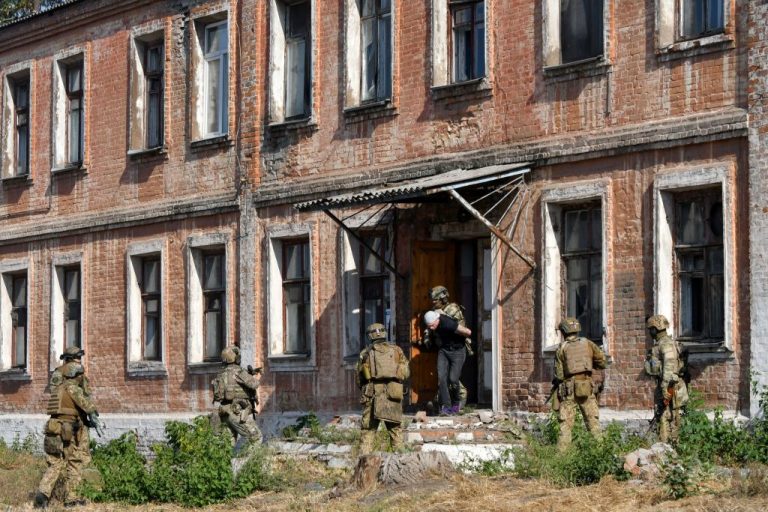The Associated Press is normalizing authoritarian practices by broadcasting a segment glorifying armed officers of the Ukraine’s SBU, the country’s intelligence agency, storming the homes of online dissenters at gunpoint.
In a 4 minute and 17 second video published to YouTube on April 29, AP cinematographers followed multiple fully armed and uniformed members of the SBU as they conducted a raid on a small apartment, arresting a middle-aged man.
In a wire release accompanying the video, AP stated the man was targeted because his personal social media posts were “praising Russian President Vladimir Putin for ‘fighting with the Nazis,’ calling for regions to secede and labeling the national flag ‘a symbol of death.’”
THE UKRAINE GEOPOLITICAL CONFLICT
- Russia Admits Heavy Pressure Under Sanctions, But Says Its Economy Far From Collapse
- Canadian Military Officials Tried to Hide Association With Ukraine’s Azov Battalion: Israeli Historian
- NATO Sets Its Gaze on Xi Jinping
- Ukraine Is Quietly Unveiling Digital Currency and a Social Credit System
AP coined its wire release Ukraine Cracks Down On ‘Traitors,’ while the YouTube video was dubbed Ukraine Hunts Down ‘Traitors’ Helping Russia.
The outlet only selectively subtitled the conversation between the man, his family, and the SBU’s agents, obscuring much of the speech from an English audience, and is curiously framed.
Success
You are now signed up for our newsletter
Success
Check your email to complete sign up
In the beginning, a uniformed agent stands before the door of the suite, hiding behind a small shield with another armed agent at his rear, demanding the target come out of his apartment.
The targeted man, which AP states is named only “Viktor,” wears a blue Adidas t-shirt and is rather gently removed from his home after exiting behind first a woman, and then another man.
Then the scene is quickly cut, showing footage of the second man standing with his hands against a wall in a separate location as the same woman looks confused.
Again, the scene is quickly cut, showing the targeted man sitting on a recliner flanked by two uniformed and masked SBU agents, one of which is compassionately stroking his head.
The agents use their own cellphone to pull up Viktor’s social media posts, which are simply graphical memes, which AP did not translate.
The agent shows the man his phone and says, “You are not speaking very nicely about the Ukrainian flag, are you?”
Viktor replies “I’m sorry,” and adds “Yes, I commented a lot. I told you, I changed my mind.”
The agent is incredulous, “Today? After our visit? Right now?”
Viktor is ordered to get his things and get dressed. When Viktor asks where he is being taken, an agent says, “All will be in accordance with Ukrainian law.”
Later footage shows subtitles of some of Viktor’s social media posts. In one, it states, “To split from Ukraine is not separatism. It is evacuation.”
In another, a burning flag is shown captioned with, “This rag is a symbol of death.”
Viktor is then loaded in a light brown domestic SUV. The uniformed agents also enter the vehicle, and Viktor is taken away.
AP stated in their wire release that Viktor is “one of nearly 400 people in the Kharkiv region alone who have been detained under anti-collaboration laws enacted quickly by Ukraine’s parliament and signed by President Volodymyr Zelenskyy.”
The article notes that under the laws, offenders who are “collaborating with Russian forces, making public denials about Russian aggression or supporting Moscow” can face up to 15 years in prison, while if their statements are considered to have caused a death, the sentence can be life.
Western precedent
In a similar incident, on March 22, in a coordinated “day of action” campaign, German police raided 100 homes across 13 states associated with social media posts that dissented against the government in a campaign to “safeguard democracy.”
Germany’s Federal Criminal Police Office (FCPO) justified the raids based on a section of the Criminal Code revised in 2021 to punish “insults, slander, and defamation of people in political life.”
The legislation contains the translated text, “Public officials and elected representatives are given special criminal protection…regardless of the political level, against hate postings.”
The President of the FCPO stated, “With the day of action, we are making it clear: Anyone who posts hate messages must expect the police to be at the door afterward.”
‘Registry of collaborators’
May 2 reporting by Breitbart noted that the leader of Ukraine’s Security Council, Oleksiy Danilov, stated that a “registry of collaborators” is being compiled and will be made publicly available.
However, Danilov “refused to say how many people have been targeted nationwide.”
A May 2 article by Canada’s establishment-left Globe and Mail interviewed Volodymyr Yavorskyy a coordinator at Ukraine’s Center for Civil Liberties, where he was paraphrased as stating “human rights advocates know of ‘dozens’ of detentions of pro-Russian activists in Kyiv alone since the new laws were passed, but how many have been targeted nationwide is unclear.”
Yavorskyy stated, “There is no complete data on the (entire) country, since it is all classified by the SBU.”
The expert added that not only can anyone be detained for up to 30 days without a court order, but that under the currently-enacted martial law, authorities are not obliged to notify attorneys of their clients’ capture.
“In reality, (law enforcement) has powers to take anyone…In effect, these people disappear, and for 30 days there’s no access to them,” he stated.
Not so humane
AP’s YouTube video and the subsequent reporting of the topic by multiple establishment media outlets gives the impression that the SBU is treating detainees humanely, and is only trying to help.
ANARCHY UNDER THE UKRAINE WAR
- As Ukraine’s Nazis, Domestic Terrorism, and War Crimes Are Normalized, the World’s Spectators Grow Numb
- Videos of Domestic Terrorism, Violence Against Russian POWs Shade Ukraine’s Public Image
- ‘Castrate’ Wounded Russians ‘Because They are Cockroaches’ Ukraine Government-Linked Hospital Leader
However, the narrative stands directly at odds with an extensive collection of videos harvested from Ukrainian-language social media and telegram channels published in March revealing a widespread practice of both uniformed officers and vigilantes subjecting citizens to public humiliation reminiscent of the Chinese Communist Party and Mao Zedong’s Great Cultural Revolution.
Once branded a “traitor,” a “collaborator,” or a “marauder,” or in many cases, simply for being a native Russian speaker, dozens of instances of victims being taped to street lamps and poles, often with their genitals exposed, have been cataloged.
In some cases, women were forced to their knees and had their hair cut.
In one particularly egregious case, a young woman was stripped naked in public and had her hair set on fire as onlookers filmed.
As recently as April 28, footage of these types of events continued to be revealed to the English-speaking Internet via the @Youblacksoul Telegram channel, which was originally banned by Twitter, but has since been reinstated.
In other cases, multiple instances of direct footage of Russian prisoners of war being shot in the groin and knees and left to bleed to death while their hands were bound were published to Ukrainian-language social media groups.
SBU dungeons
April 14 reporting by investigative journalists Mint Press News recounted a story told by Anatoly Shariy, a Ukrainian opposition figure, of a journalist allegedly captured by the SBU and given the pseudonym Igor to protect his identity.
Shariy alleges that Igor was being used under duress to engineer an assassination attempt against him.
Author Dan Cohen states he spoke with Igor directly by telephone, where the journalist said that when Igor was captured by the SBU, he was taken away in handcuffs and with his head in a sack.
Igor said he was transported to a “sports complex-turned temporary prison” directly connected to SBU headquarters in Kiev.
The article states the SBU “oversees” members of the “Territorial Defense,” described as “ultra-nationalist civilians and criminal elements who the government gave weapons in the streets in the first days of Russia’s offensive,” as they “beat, torture and even kill their prisoners.”
“Igor says that he was interrogated three times, with each session lasting between 15 and 30 minutes. The beatings were carried out by Territorial Defense volunteers while SBU officers instructed them on how to torture and asked him questions,” said Cohen.
Igor was directly quoted as stating, “They used a lighter to heat up a needle, then put it under my fingernails…The worst was when they put a plastic bag over my head and suffocated me and when they held the muzzle of a Kalashnikov rifle to my head and forced me to answer their question.”
The torture, Igor stated, however, was light compared to what he said he witnessed Russian POWs endure. The journalist was paraphrased as stating he heard captured soldiers “who were beaten with metal pipes while the Ukrainian national anthem played on repeat in the background.”
“I could hear it because all the torture was done in a nearby room. It was psychologically severe. This was done at night, the sounds of beatings were constant. It was difficult to sleep,” Igor told Cohen.
Additionally, Cohen recounted testimony from Andrey, another aliased man with dual Russian-European citizenship who was detained at the SBU dungeon, that he witnessed “police beating what they told him was a Russian saboteur.”
Cohen framed the account as, “Tied to a chair, police repeatedly punched the man in the torso, the face, and back of the head as blood poured from his mouth.”
“The police weren’t even interested in what he had to say. They would ask a question, he would start speaking slowly and they would hit him in the head,” the interviewee stated.
“They were taking out aggression and fear on him like a punching bag.”
Andrey said he was told the only reason he was personally spared the beatings and his life was because of his second passport.







